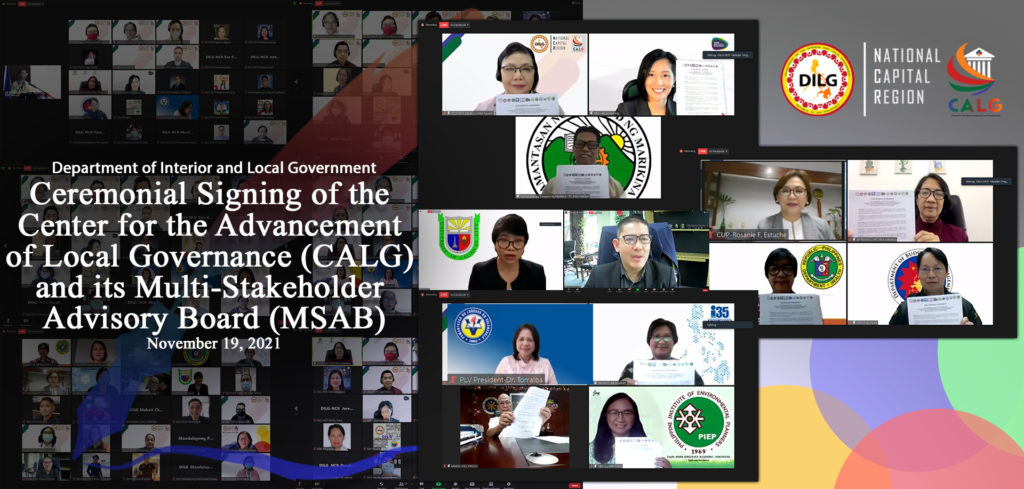
The Department of the Interior and Local Government â National Capital Region (DILG-NCR) officially launched the Center for the Advancement of Local Governance (CALG) through a ceremonial signing of the Partnership Agreement with local governance stakeholders on November 19, 2021 via Zoom.
The CALG calls for stronger collaboration, cooperation, and coordination between national government agencies (NGAs), non-government organizations (NGOs), local resource institutions (LRIs), and other local stakeholders in the NCR to ensure the continuous delivery of responsive capacity building interventions to local government units (LGUs) that contributes to the advancement of local governance practice in the region.
Twelve (12) partner institutions joined the ceremonies and signed the Partnership Agreement establishing the CALG and its Multi-Stakeholder Advisory Board (MSAB), consisting of:
Four (4) NGAs, namely: Metropolitan Manila Development Authority (MMDA), headed by Chairman Benjamin âBenhurâ Abalos and represented by MMDA Deputy Chairman USec Frisco San Juan, Jr.; Department of Budget and Management â NCR, headed by Regional Director Ruby C. Muro; Metro Manila Center for Health Development (MMCHD), headed by Regional Director Dr. Gloria J. Balboa; and Philippine Information Agency (PIA) â NCR, headed by OIC-Regional Director Susan G. de Leon and represented by PIA-NCR Information Officer Jimmyley E. Guzman.
Seven (7) LRIs, namely: UP-NCPAG Center for Local and Regional Governance (CLRG), headed by its Director, Prof. Alicia B. Celestino; Asian Institute of Management, headed by its President and Dean Jikyeong Kang, PhD.; City University of Pasay, headed by its OIC/ Acting President, Dr. Rosanie Estuche; Pamantasan ng Lungsod ng Marikina, headed by its President, Dr. Erico M. Habijan; Pamantasan ng Lungsod ng Valenzuela, headed by its President, Dr. Nedeña C. Torralba; University of Caloocan City, headed by its Officer-in-Charge, Prof. Marilyn T. De Jesus; and University of Makati, headed by its OIC President, Dr. Elyxzur C. Ramos.
One (1) NGO, the Philippine Institute of Environmental Planners, represented by its National President, Enp. Ar. Maria Jorquesa A. Hakcholna.
DILG-NCR Regional Director Maria Lourdes L. Agustin, CESO III and OIC-Assistant Regional Director Atty. Ana Lyn R. Baltazar-Cortez, CESO V, the Local Governance Regional Resource Center â NCR program manager, also attended the event alongside all members of the LGRRC Core Team.
Also in attendance were representatives from the DILG-NCR Field offices.
RD Agustin expressed her grateful appreciation to the partner institutions for their positive response to the DILG-NCRâs call for partnership. RD Agustin emphasized the need to work together to empower and strengthen LGUs and address the pressing concerns Metro Manila residents are now facing. RD Agustin further encouraged all partner institutions to support the CALGâs initiatives to promote good local governance in the region.
LGOO VI Raymond de Asis, on the other hand, presented the history of LGRRC from its inception in 2010 as a dynamic, interactive virtual program that contributes to building the DILG as a knowledge-centric organization. The LGRRC contributed to further strengthening and capacitating local government units in the region, and is now transitioning to become the CALG, a refreshed LGRRC that aims to serve as a platform for multi-stakeholder convergence on advancing local governance theory and practice in the NCR and for harmonizing interventions to promote inclusive development through effective knowledge management and capacity development towards effective local governance.
All partner institutions manifested their support to the CALG through messages delivered during the ceremony, as well as messages sent through the Zoom chat box.
OIC-ARD Baltazar-Cortez in her closing remarks, congratulated all partner institutions and stakeholders for their decision to sign the partnership agreement, which marks an important milestone, the beginning of a new chapter in the journey to promote good local governance towards inclusive and sustainable development. OIC-ARD Baltazar-Cortez highlighted the importance of the CALG as a tangible platform for mobilizing the shared institutional knowledge and capabilities of all partner institutions to help address local governance issues and challenges in the region.
With the institutionalization of the CALG and its MSAB, more can be achieved in the NCR. As RD Agustin said, with this partnership, the CALG can drive LGUs to attain greater heights. This is a challenge to all partner institutions to keep pushing forward together until the vision of each Filipino having an opportunity to create a matatag, maginhawa, at panatag na buhay is realized.
